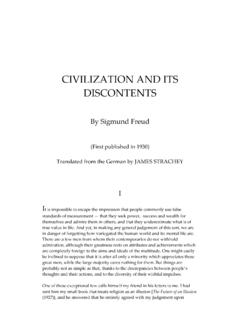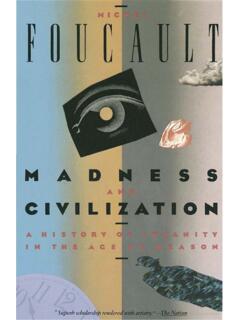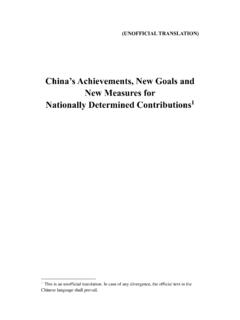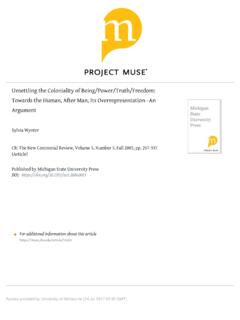Transcription of CIVILIZATION AND ITS DISCONTENTS - Stephen Hicks
1 CIVILIZATION AND ITS DISCONTENTS By Sigmund Freud (First published in 1930) Translated from the German by JAMES STRACHEY I It is impossible to escape the impression that people commonly use false standards of measurement that they seek power, success and wealth for themselves and admire them in others, and that they underestimate what is of true value in life. And yet, in making any general judgement of this sort, we are in danger of forgetting how variegated the human world and its mental life are.
2 There are a few men from whom their contemporaries do not withhold admiration, although their greatness rests on attributes and achievements which are completely foreign to the aims and ideals of the multitude. One might easily be inclined to suppose that it is after all only a minority which appreciates these great men, while the large majority cares nothing for them. But things are probably not as simple as that, thanks to the discrepancies between people s thoughts and their actions, and to the diversity of their wishful impulses.
3 One of these exceptional few calls himself my friend in his letters to me. I had sent him my small book that treats religion as an illusion [The Future of an Illusion (1927)], and he answered that he entirely agreed with my judgement upon religion, but that he was sorry I had not properly appreciated the true source of religious sentiments. This, he says, consists in a peculiar feeling, which he himself is never without, which he finds confirmed by many others, and which he may suppose is present in millions of people.
4 It is a feeling which he would like to call a sensation of eternity , a feeling as of something limitless, unbounded as it were, oceanic . This feeling, he adds, is a purely subjective fact, not an article of faith; it brings with it no assurance of personal immortality, but it is the source of the religious energy which is seized upon by the various Churches and religious systems, directed by them into particular channels, and doubtless also exhausted by them. One may, he thinks, rightly call oneself religious on the ground of this oceanic feeling alone, even if one rejects every belief and every illusion.
5 The views expressed by the friend whom I so much honour, and who himself once praised the magic of illusion in a poem, caused me no small difficulty. I cannot discover this oceanic feeling in myself. It is not easy to deal scientifically with feelings. One can attempt to describe their physiological signs. Where this is not possible and I am afraid that the oceanic feeling too will defy this kind of characterization nothing remains but to fall back on the ideational content which is most readily associated with the feeling.
6 If I have understood my friend rightly, he means the same thing by it as the consolation offered by an original and somewhat eccentric dramatist to his hero who is facing a self-inflicted death. We cannot fall out of this world. That is to say, it is a feeling of an indissoluble bond, of being one with the external world as a whole. I may remark that to me this seems something rather in the nature of an intellectual perception, which is not, it is true, without an accompanying feeling-tone, but only such as would be present with any other act of thought of equal range.
7 From my own experience I could not convince myself of the primary nature of such a feeling. But this gives me no right to deny that it does in fact occur in other people. The only question is whether it is being correctly interpreted and whether it ought to be regarded as the fons et origo of the whole need for religion. I have nothing to suggest which could have a decisive influence on the solution of this problem. The idea of men s receiving an intimation of their connection with the world around them through an immediate feeling which is from the outset directed to that purpose sounds so strange and fits in so badly with the fabric of our psychology that one is justified in attempting to discover a psycho-analytic that is, a genetic-explanation of such a feeling.
8 The following line of thought suggests itself. Normally, there is nothing of which we are more certain than the feeling of our self, of our own ego. This ego appears to us as something autonomous and unitary, marked off distinctly from everything else. That such an appearance is deceptive, and that on the contrary the ego is continued inwards, without any sharp delimitation, into an unconscious mental entity which we designate as the id and for which it serves as a kind of facade this was a discovery first made by psycho-analytic research, which should still have much more to tell us about the relation pf the ego to the id.
9 But towards the outside, at any rate, the ego seems to maintain clear and sharp lines of demarcation. There is only one state admittedly an unusual state, but not one that can be stigmatized as pathological in which it does not do this. At the height of being in love the boundary between ego and object threatens to melt away. Against all the evidence of his senses, a man who is; in love declares that I and you are one, and is prepared to behave as if it were a fact. What can be temporarily done away with by a physiological [ , normal] function must also, of course, be liable to be disturbed by pathological processes.
10 Pathology has made us acquainted with a great number of states in which the boundary lines between the ego and the external world become uncertain or in which they are actually drawn incorrectly. There are cases in which parts of a person s own body, even portions of his own mental life his perceptions, thoughts and feelings appear alien to him and as not belonging to his ego; there are other cases in which he ascribes to the external world things that clearly originate in his own ego and that ought to be acknowledged by it.









